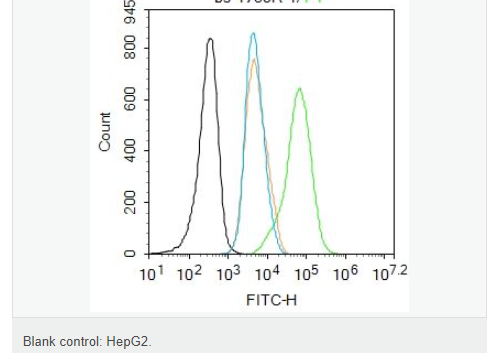

貨號
產(chǎn)品規(guī)格
售價
備注
BN40494R-100ul
100ul
¥2470.00
交叉反應(yīng):Human(predicted:Mouse,Rat,Chicken,Dog,Pig,Cow,Rabbit,Sheep) 推薦應(yīng)用:Flow-Cyt,ELISA
產(chǎn)品描述
| 英文名稱 | phospho-c-Jun (Thr91+Thr93) |
| 中文名稱 | 磷酸化原癌基因c-Jun抗體 |
| 別 名 | c-Jun (phospho T91 + T93); p-c-Jun(Thr91+Thr93); p-Jun(Thr91+Thr93); Transcription factor AP-1; Jun oncogene; JUN; AP 1; AP1; AP-1; Enhancer Binding Protein AP1; Jun Activation Domain Binding Protein; JUN protein; JUNC; p39; Proto oncogene cJun; Transcription Factor AP1; V jun avian sarcoma virus 17 oncogene homolog; vJun Avian Sarcoma Virus 17 Oncogene Homolog; JUN_HUMAN; Activator 1; Proto-oncogene c-Jun; V-jun avian sarcoma virus 17 oncogene homolog. |
| 產(chǎn)品類型 | 磷酸化抗體 |
| 研究領(lǐng)域 | 腫瘤 染色質(zhì)和核信號 信號轉(zhuǎn)導(dǎo) 轉(zhuǎn)錄調(diào)節(jié)因子 |
| 抗體來源 | Rabbit |
| 克隆類型 | Polyclonal |
| 交叉反應(yīng) | Human, (predicted: Mouse, Rat, Chicken, Dog, Pig, Cow, Rabbit, Sheep, ) |
| 產(chǎn)品應(yīng)用 | ELISA=1:5000-10000 Flow-Cyt=1ug/Test not yet tested in other applications. optimal dilutions/concentrations should be determined by the end user. |
| 分 子 量 | 43kDa |
| 細胞定位 | 細胞核 |
| 性 狀 | Liquid |
| 濃 度 | 1mg/ml |
| 免 疫 原 | KLH conjugated Synthesised phosphopeptide derived from human c-Jun around the phosphorylation site of Thr91/93:TT(p-T)P(p-T)PT |
| 亞 型 | IgG |
| 純化方法 | affinity purified by Protein A |
| 儲 存 液 | 0.01M TBS(pH7.4) with 1% BSA, 0.03% Proclin300 and 50% Glycerol. |
| 保存條件 | Shipped at 4℃. Store at -20 °C for one year. Avoid repeated freeze/thaw cycles. |
| PubMed | PubMed |
| 產(chǎn)品介紹 | C-jun (Oncoprotein C-jun) is a component of the transcription factor AP-1 that binds and activates transcription at TRE/AP-1 elements and appears to be a major downstream target of the SAPK/JNK signaling pathway. The transcriptional activity of c-Jun is regulated by phosphorylation at Ser63 and Ser73. Extracellular signals including growth factors, transforming oncoproteins and UV irradiation stimulate phosphorylation of c-Jun at Ser63/73 and activate c-Jun dependent transcription. Mutation of Ser63/73 renders c-Jun nonresponsive to mitogenic and stress induced signaling pathways. The MAP kinase homologue, SAPK/JNK, binds to the N-terminal region of c-Jun and phosphorylates c-Jun at Ser63/73. In addition, the activity of SAPK/JNK is stimulated by the same signals that activate c-Jun. Function: Transcription factor that recognizes and binds to the enhancer heptamer motif 5'-TGA[CG]TCA-3'. Promotes activity of NR5A1 when phosphorylated by HIPK3 leading to increased steroidogenic gene expression upon cAMP signaling pathway stimulation. Subunit: Heterodimer with either FOS or BATF3 or ATF7. The ATF7/JUN heterodimer is essential for ATF7 transactivation activity. Interacts with DSIPI; the interaction inhibits the binding of active AP1 to its target DNA (By similarity). Interacts with HIVEP3 and MYBBP1A (By similarity). Interacts with SP1, SPIB and TCF20. Interacts with COPS5; the interaction leads indirectly to its phosphorylation. Component of the SMAD3/SMAD4/JUN/FOS/complex which forms at the AP1 promoter site. The SMAD3/SMAD4 heterodimer acts syngernistically with the JUN/FOS heterodimer to activate transcription in response to TGF-beta. Interacts (via its basic DNA binding and leucine zipper domains) with SMAD3 (via an N-terminal domain); the interaction is required for TGF-beta-mediated transactivation of the SMAD3/SMAD4/JUN/FOS/complex. Interacts with RNF187. Binds to HIPK3. Subcellular Location: Nucleus. Post-translational modifications: Phosphorylated by CaMK4 and PRKDC; phosphorylation enhances the transcriptional activity. Phosphorylated by HIPK3. Phosphorylated by DYRK2 at Ser-243; this primes the protein for subsequent phosphorylation by GSK3B at Thr-239. Phosphorylated at Thr-239, Ser-243 and Ser-249 by GSK3B; phosphorylation reduces its ability to bind DNA. Phosphorylated by PAK2 at Thr-2, Thr-8, Thr-89, Thr-93 and Thr-286 thereby promoting JUN-mediated cell proliferation and transformation. Phosphorylated by PLK3 following hypoxia or UV irradiation, leading to increase DNA-binding activity. Acetylated at Lys-271 by EP300. Similarity: Belongs to the bZIP family. Jun subfamily. Contains 1 bZIP (basic-leucine zipper) domain. SWISS: P05412 Gene ID: 3725 Database links: Entrez Gene: 3725 Human Entrez Gene: 16476 Mouse Omim: 165160 Human SwissProt: P05412 Human SwissProt: P05627 Mouse Unigene: 525704 Human Unigene: 696684 Human Unigene: 275071 Mouse Unigene: 93714 Rat Important Note: This product as supplied is intended for research use only, not for use in human, therapeutic or diagnostic applications. |
